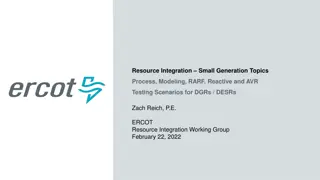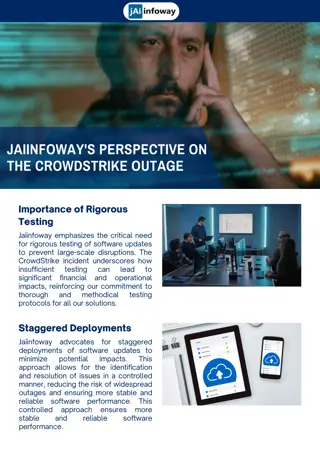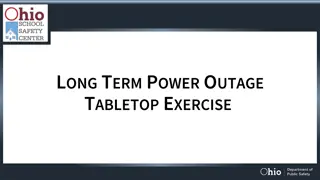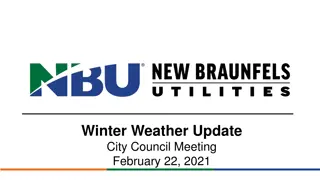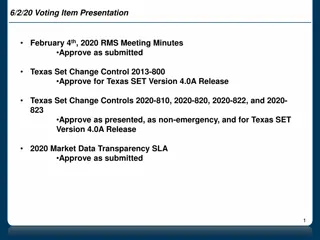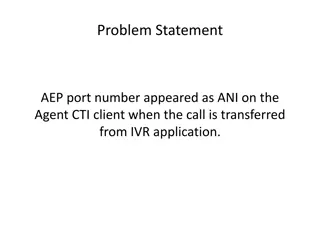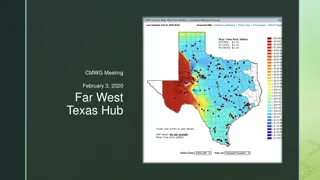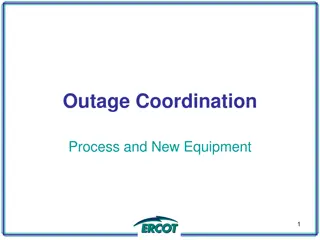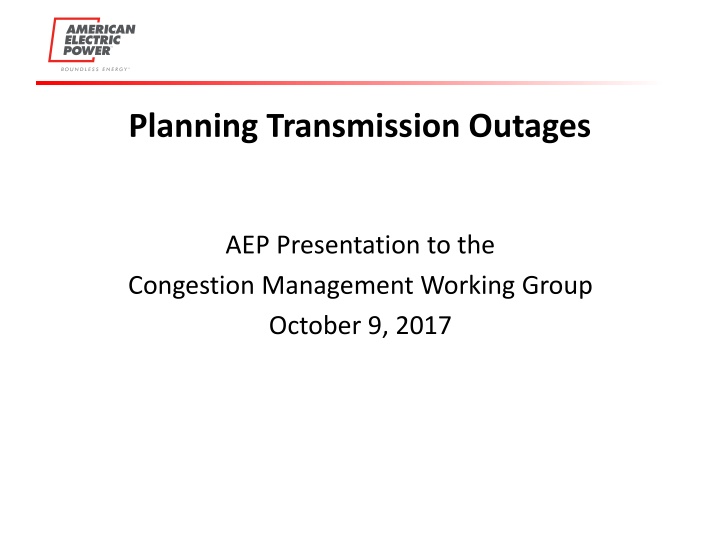
ERCOT Outage Planning and Management Activities Overview
Learn about the outage coordination and planning activities within the ERCOT system, including the role of ERCOT, TSP outage planning considerations, and ERCOT's approach to scheduling outages. Discover insights on extended outage considerations and ERCOT's processes for economic impact assessment related to outages.
Download Presentation

Please find below an Image/Link to download the presentation.
The content on the website is provided AS IS for your information and personal use only. It may not be sold, licensed, or shared on other websites without obtaining consent from the author. If you encounter any issues during the download, it is possible that the publisher has removed the file from their server.
You are allowed to download the files provided on this website for personal or commercial use, subject to the condition that they are used lawfully. All files are the property of their respective owners.
The content on the website is provided AS IS for your information and personal use only. It may not be sold, licensed, or shared on other websites without obtaining consent from the author.
E N D
Presentation Transcript
Planning Transmission Outages AEP Presentation to the Congestion Management Working Group October 9, 2017
Nodal Protocols Section 3: Management Activities for the ERCOT System (1) 3.1 Outage Coordination Outage Coordination is the management of Transmission Facilities Outages and Resource Outages in the ERCOT System. Facility owners are solely and directly responsible for the performance of all maintenance, repair, and construction work, whether on energized or de-energized facilities, including all activities related to providing a safe working environment. (1) 3.1.1 Role of ERCOT ERCOT shall coordinate and use reasonable efforts, consistent with Good Utility Practice, to accept, approve or reject all Outage schedules for maintenance, repair, and construction of both Transmission Facilities and Resources within the ERCOT System. ERCOT may reject an Outage schedule under certain circumstances, as set forth in these Protocols. (1) 3.1.3.1 Transmission Facilities Each TSP shall provide to ERCOT a Planned Outage or Maintenance Outage plan in an ERCOT-provided format for the next 12 months updated monthly. Planned Outage or Maintenance reviews of the 12-month plan with each TSP at least twice per year.
TSP Outage Planning Planning horizon is 6-9 months out Weather, materials, etc. can impact Impractical to look too far out due to significant uncertainty Rolling 12-month running outage plan and updates When ERCOT recognizes a High Impact Outage they contact the TSP Actions are taken by TSPs and ERCOT to mitigate impact to Market
TSP Outage Planning Extended Outage Considerations: Resource availability and weather Landowner Impacts: harvest, hunting Community relations and local government needs Regulatory compliance Impact to Generators Safety and Risk Mitigation Financial impacts Material and equipment delivery
ERCOT Outage Planning What has been received can be seen in OS What has been received will be considered for scheduling when < 90 days and > 75 days Outages are not considered for inclusion in CRR models until approved however, OS can help CRR account holders anticipate value of CRR based on OS submissions ERCOT has no Protocol support to consider economic impact of outages ERCOT does not have the tool or FTEs to perform economic analysis task
Other Considerations NPRR758, Improved Transparency for Outages Potentially having a High Economic Impact (Rescheduled Outages) ERCOT completed implementation of changes to the Outage Scheduler for the remaining grey-boxed portions in September. NPRR758 supports identification of Outages that have historically resulted in high congestion costs, as adjusted through a stakeholder review process to account for upgrades and other changes that would affect the fidelity of this list as an indicator of Outages that might cause future congestion; and includes identification and posting of High Impact Transmission Elements (HITEs) and High Impact Outages (HIOs) and a Rescheduled Outage type.
Other Considerations Inability to predict load 90 days out with great deal of accuracy Reliability impacts to deferring reliability based outage projects More qualitative information on outages in rolling 12-month outage plan Protocol Revisions
Next Steps Continue discussions with Outage Coordination Working Group Scope Change for OCWG





